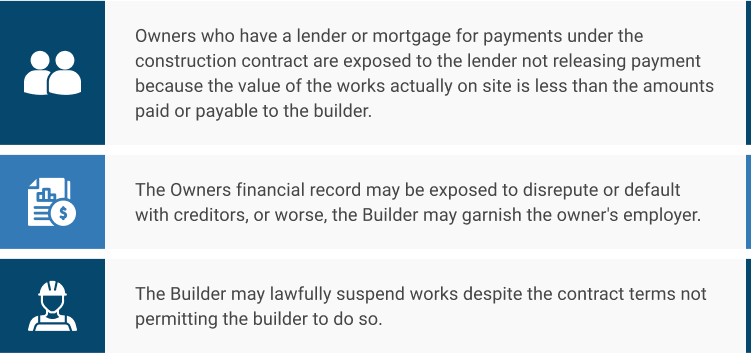What Homeowners Should Do Before Contracting?
From 21 March 2021, Home Owners residential building contract is subject to the Building and Construction Industry Security of Payment Act 1999 (NSW).
Whilst the Master Builders, HIA, and Office of Fair Trading standard form contracts do not expressly make provision for the application of SOPA, the parties are bound by the SOPA and Owners are at risk of savvy Builders using this expedited method to payment enforcement. Despite this, the SOPA terms are implied into the home building contract.
Section 7 of the Home Building Act 1989 and relevant Regulation requires a contract for residential building work to include information in the approved form that explains the operation of SOPA. A copy of the current version of the form from February 2021 is available at this link. Owners should ensure this form is included in their contract.
Understanding the Tight Time Table Imposed by SOPA
One of the key risks associated with SOPA is the tight time table imposed on parties to construction contracts. To avoid loss of rights, it is extremely important that homeowners understand the importance of:
- The owner(homeowner) serving a payment schedule within the required period after receiving a payment claim and including in it all reasons for withholding payment. Under the standard form industry templates such as HIA, MBA, and OFT, the time for owners to issue a payment schedule remains 10 working days despite shorter payment terms; and
- The builder determines whether any response received from the owner amounts to a payment schedule, the requirements for which are rather loose and if so taking further action within the required timeframe. Owners should expressly specify their payment schedule is a payment schedule made under SOPA to mitigate risks with failing to issue a payment schedule; and
- Savvy Builders often include special conditions into their building contracts to make terms already favourable to the Builder more unfavorable to the Owner. Owners should ensure that their builder has not reduced the number of days the owner has to issue a payment schedule.
Related content: Building payment schedule: Secure your payments on time
The Payment Claim Process
The Builder’s entitlement to make a claim under SOPA arises from a reference date. The reference date is specified in the contract. The parties can agree on the due date for progress payments, but Section 8 of SOPA provides that, if the contract does not specify the reference date then this will be the default under the SOPA.
Most home building contracts allow the Builder to issue progress claims upon practical completion of each stage of works, simply, a reference date is when the stage of works is practically complete.
On each reference date, the builder may issue a payment claim on the Owner. A payment claim can be a relatively informal document. It may be in the form of a tax invoice, email or letter. So long as the document satisfies the low threshold requirements of section 13 of the SOPA. In particular, the works are described, the amount of the claim is specified and that the claim is made under SOPA. The requirements of a payment claim have a low benchmark and are relatively easy to satisfy.
The homeowner then has 10 business days to serve a payment schedule on the builder. The payment schedule should specify the amount that the Owner intends to pay the Builder. If the amount proposed is less than the amount claimed by the Builder then the Owner must also include reasoning for withholding. Owners should provide detailed reasons for withholding and supporting evidence as part of the payment schedule. Failing to do so may prevent the Owner from relying on the information if the matter escalates to adjudication.
Owners should urgently obtain advice from a construction lawyer whenever they receive a claim for payment and the owner does not agree with the amount, the due date, or anything included in the claim.
The Contractor's Actions
If the homeowner serves a payment schedule, but the builder disputes the scheduled amount, the due date for payment, or the reasons for withholding then the builder has 10 business days from receipt of the payment schedule to lodge and serve an adjudication application with the authorised nominating authority.
If the homeowner serves a payment schedule and the builder accepts it, but the homeowner does not make the payments provided for in the payment schedule:
- The builder may suspend work on 2 business days’ notice pursuant to section 27 and is given statutory protection in relation to action taken by the homeowner under the contract in relation to such suspension.
- The builder has 20 business days from the due date for payment to prepare and serve an adjudication application, in which case the homeowner has five business days after receiving the application to prepare and serve an adjudication response.
If the homeowner does not satisfy the payment claim or serve a payment schedule within the required timeframe, the amount claimed becomes a statutory debt pursuant to section 14(4) and the builder may either:
- issue a section 17.2 notice notifying the homeowner, within 20 business days of the due date for payment, that the builder intends to apply for adjudication, in which case the homeowner has 5 business days from receipt of the notice to serve a payment schedule and the builder has 10 business days from the conclusion of that 5 business day period to apply for adjudication; or
- commence court proceedings (which ends the process under SOPA).
The Adjudication Process
Once the builder has served an adjudication application, the owner has five business days to serve an adjudication response. The adjudicator will then have 10 business days from the date of acceptance of the application to make a determination.
During the adjudication process, the builder and owner will have the opportunity to present evidence and arguments to the adjudicator. The adjudicator will then make a decision on the progress payment claim, taking into account the evidence and arguments presented by both parties.
Homeowners should engage a construction law specialist to advise and prepare the owners adjudication response to give them the best chance of defending the payment schedule.
Related Content: Adjudicating Payment Claims: Fact Sheet
Enforcing the Adjudicator's Determination
If the adjudicator has made a favourable determination in favour of the Builder, the owner must satisfy the determination within five business days. If the owner fails to do so, then the builder may take the following actions:
- suspend performance of the work, on 2 business days’ notice; and/or
- enter judgment with the court for the amount of the adjudication certificate issued by the adjudicator and enforce that as a judgment of the court.
Upon receipt of a court judgement, the builder may also apply for an enforcement order with the court under the Contractor’s Debt Act, which will require the ownerunder the project to pay the amount determined by the adjudicator.
The court has the power to make any order it considers appropriate to enforce the determination, including issuing a garnishee order for the Builder to take the debt from the owner’s bank account or deduct payments owing to the owner from the owner’s employer.
Setting Aside Determination
It is important to note that the Supreme Court has the power to set aside an adjudicator’s determination if it is satisfied that the adjudicator acted beyond their jurisdiction, the determination was made as a result of fraud or corruption, or there was a failure to comply with the rules of natural justice.
Risks and Implications for Owners
Owners should be aware that a favourable determination for the Builder exposes Owners to the following risks.

Practical Tips for Homeowners
As a homeowner, it is important to be aware of the rights and obligations of both parties under SOPA and the potential risks of non-payment. Here are some practical tips to manage these risks:
- Get your contract reviewed by a construction lawyer prior to signing the contract and have a construction lawyer available for consultation for timely advice.
- Understand the payment schedule and due dates for progress payments outlined in the construction contract.
- Ensure that all payment claims are properly documented and payments are recorded.
- Respond to payment claims within the required timeframe and include all reasons for withholding payment in the payment schedule.
- Maintain a relationship with a construction lawyer in case you need to seek legal advice if there is a dispute over a payment claim or if the builder is seeking to suspend work or enter judgement with the court.

Get Expert Advice on Security of Payments
Contacts Specialist is a building and construction law firm that advises owners and contractors on their rights and enforcement of their rights under the Security of Payments law. If you are a homeowner that has received a claim for payment or adjudication application that you wish to defend then call John Dela Cruz, our principal solicitor who has more than 10 years experience with security of payment enforcement.




